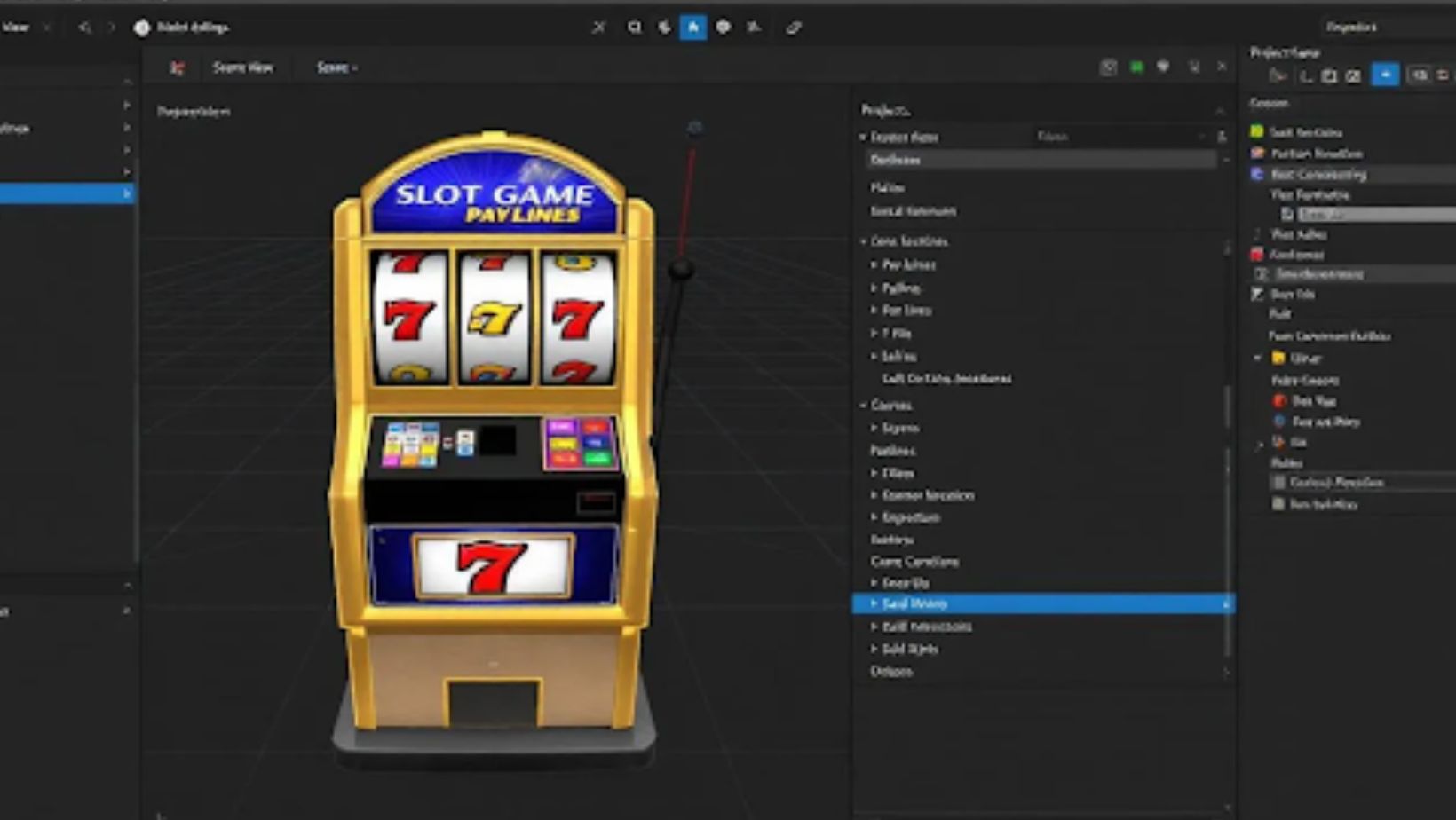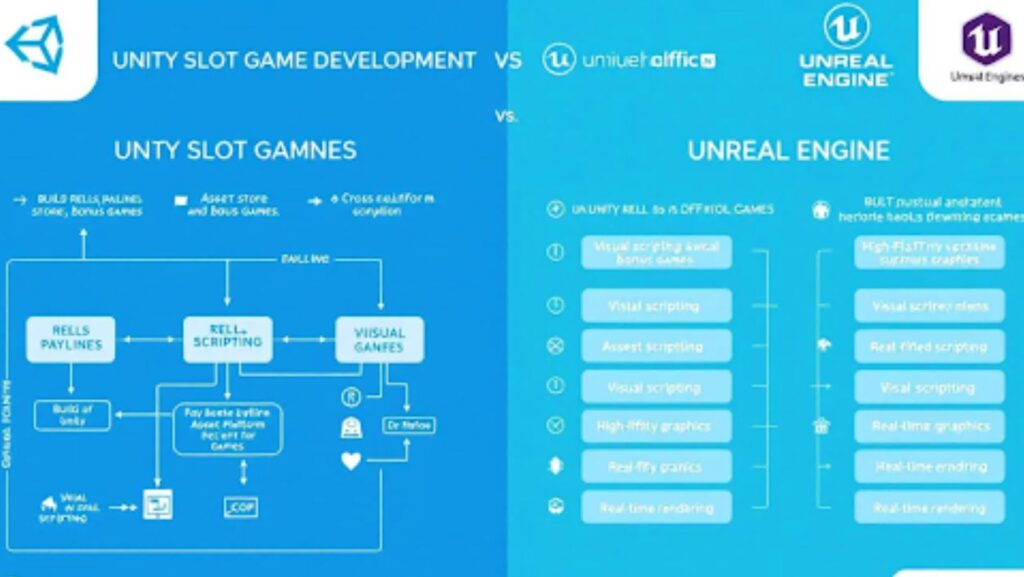If you’re planning a new slot title, the first big decision is your engine. Both Unity and Unreal can deliver slick, high-performing social casino experiences—think the polish players expect from platforms like Sweepstakes Casino Sixty6—but each takes you there in a different way. This guide compares them specifically through the lens of slot mechanics—reels, paylines, bonus features, RNG, and live-ops—so you can choose the stack that matches your team, timeline, and business goals. A slot machine game is a core type of casino game, and its development plays a significant role in the rapidly evolving gaming industry, which continues to grow with advances in technology and player engagement.
Both Unity and Unreal are leading game engines widely used in slot machine game development, enabling developers to create engaging and innovative slot machine games for the modern casino games market. You’ll see where Unity slot game development shines (especially for 2D/2.5D and mobile), where Unreal flexes (cinematics and rich VFX), and how to architect fair, scalable systems in either engine.
Evaluation criteria for slot projects
- Platforms: iOS/Android first? Web build required? PC for streaming or desktop stores? Supporting multiple platforms is crucial to reach a wider audience, ensuring seamless compatibility across desktops, tablets, and mobile devices.
- Team skills: C# and component thinking vs. Blueprints/C++ and Actor patterns.
- Iteration speed: How fast can designers tweak spin timing, symbol weights, and paytables without a full build?
- UI/VFX pipeline: Tooling for dynamic paytables, juicy big-win animations, and particle bursts that don’t tank FPS.
- Mobile performance: Smooth 60 FPS on mid-tier devices, low memory churn, small app size, quick cold start. With the rapid growth of mobile gaming, optimizing for this segment is essential to stay competitive and meet evolving player expectations.
- Compliance and telemetry: Analytics, remote config, A/B testing, audit logs, and privacy by design.
Core slot mechanics (quick ref)
- Reels: Spinning reels with symbol strips, spin acceleration, deceleration, bounce, and stop events synchronized with audio.
- Paylines & ways-to-win: Static masks or dynamic paths; evaluation order and early-out optimizations matter.
- Volatility feel in F2P: You’re not modeling real-money RTP, but you do model pacing, reward cadence, and perceived fairness.
- Bonus games: Pick-’em boards, free spins, multi-stage wheels, and collection events with escalating reveals.
- Fairness & RNG: Server-authoritative outcomes, deterministic replays for QA, and transparent telemetry.
Unity for slot game development

Strengths
- UI workflows: UGUI and UI Toolkit handle complex paytables, lobby carousels, and dynamic offers with solid performance.
- C# productivity: Component-based design is natural for ReelController, Symbol, and PaylineEvaluator scripts. Easy onboarding for generalist devs.
- Asset scalability: Addressables let you ship themed reskins and time-limited events without bloating the base build. Game assets can be reused across different unity games or even sold for customization, providing additional monetization opportunities.
- Animation tools: Animator, Timeline, and Animation Curves are perfect for spin cadence, near-miss easing, and big-win camera shakes.
- Ecosystem: Mature SDK landscape for ads, IAP, analytics, remote config, and mediation—crucial for free-to-play ops. Unity’s flexibility also supports developing mobile apps, allowing easy integration of gamification features and cross-platform deployment.
Typical Architecture
- Data: ScriptableObjects for symbol tables, paylines, bonus configs, and volatility presets.
- Logic: State machine (base, respin, free spins, wheel, post-win) with event channels for start/stop, scatter, and feature triggers. Integrate various slot game features such as free spins, bonus rounds, and random number generators to enhance gameplay and fairness.
- Content: Prefab-driven reels/symbols; Addressables for theme swaps and seasonal promos. Design a cohesive game environment and ensure an engaging user interface to provide a visually appealing and user-friendly experience for players.
Performance Tips (Mobile + Web)

- Pool symbol objects to avoid GC spikes; pre-warm pools on boot. When developing mobile slots, ensure smooth performance in mobile games by optimizing object pooling and minimizing runtime allocations.
- Use sprite atlases and appropriate texture compression; minimize overdraw with tight sprite bounds while maintaining a visually appealing presentation to enhance player engagement.
- Drive spin timing via Animation Curves (not per-frame random math); keep particle FX modest.
- Profile on real mid-tier devices; watch startup time and memory footprint.
Where Unity Can Struggle
- Heavy 3D cinematic sequences and complex real-time materials require careful optimization to match Unreal’s out-of-box polish.
Unreal Engine for slot mechanics
Strengths
- Visual fidelity: Materials, lighting, and Niagara particles deliver impressive graphics and premium-feel jackpots and bonus reveals with minimal setup. Unreal leverages cutting edge technologies to achieve high levels of visual immersion, surpassing what is typically possible with the Unity engine, which, while versatile and user-friendly, does not match Unreal’s advanced graphics capabilities.
- Blueprint velocity: Designers can prototype reels, paylines, and bonus flows visually; escalate to C++ only on hot paths.
- Sequencer and UMG: Cinematic control for feature teases; robust widget animation for paytables and lobbies.
Typical Architecture
- Data: DataAssets/DataTables for symbol strips, payline masks, and pay multipliers.
- Logic: Actor Components for Reel/Symbol; Gameplay Tags or state enums for mode transitions; Event Dispatchers for spin events. Implementation and balancing of game mechanics are crucial here to ensure fair and engaging gameplay.
- Hybrid approach: Blueprint for orchestration; C++ for evaluation loops and performance-critical math. A robust tech stack and thoughtful game design are essential in Unreal slot projects to deliver visually appealing and user-friendly experiences.
Performance Tips (Mobile + PC)
- Favor atlased sprites and simple unlit materials for symbols and UI; keep Niagara CPU emitters for bursty coin/confetti moments.
- Virtualize large paytable lists; cache evaluation results when possible.
- Mind package size and boot time; audit plugins and content. Optimize for web browsers to ensure fast loading and smooth gameplay across devices.
Where Unreal Can Be Overkill
- For lightweight 2D/2.5D slots targeting modest phones, the engine’s baseline footprint and learning curve may be more than you need.
Head-to-head comparison
| Category | Unity | Unreal | What it means for slots |
| Languages & tooling | C#, components, rich editor tooling | Blueprints + C++ | Unity accelerates generalist teams; Unreal enables designer-led prototyping with C++ fallback |
| UI systems | UGUI, UI Toolkit | UMG/Slate | Both handle complex paytables; Unreal’s widget animation feels cinematic |
| VFX & animation | Animator, Timeline, particles | Niagara, Sequencer | Unreal wins on out-of-box spectacle; Unity closes the gap with craft |
| Asset management | Addressables | Asset Manager | Both support live content; Addressables are very mature for F2P |
| Mobile footprint | Generally lean | Larger by default | Unity often boots faster on mid-tier devices |
| Web options | WebGL builds | Pixel streaming/third-party wrappers | Unity is typically simpler for browser slots |
| Marketplace plugins | Vast mobile-first SDKs | Strong visuals and tooling | Pick based on your monetization/analytics stack |
| Iteration speed | Fast code-compile and prefab workflows | Blueprint iterations are quick; C++ adds complexity | Different paths to the same goal |
| Hiring & skills | Huge C# talent pool | Blueprint/C++ mix | Both engines are widely used by game developers, development companies, and gaming companies to create multiple games across genres, including slots and casino titles. Consider who you can hire and train |
Implementing reels, paylines, and bonus games
Reels
Unity approach:
- Store symbol strips in a ScriptableObject.
- Drive spin acceleration and deceleration with Animation Curves.
- Dispatch events on exact stop frames for audio sync
In a slot machine, the spinning reels are central to determining the winning combination for each spin. As in traditional slot machines, the arrangement of symbols that land on the paylines after the reels stop decides whether a player achieves a winning combination and receives a reward.
public class ReelController : MonoBehaviour { public AnimationCurve spinCurve; public Symbol[] symbolStrip; public event Action< Symbol[]> OnStopped; IEnumerator Spin(float duration) { float t = 0f; while (t < duration) { float speed = spinCurve.Evaluate(t / duration); transform.localPosition += Vector3.down speed Time.deltaTime; t += Time.deltaTime; yield return null; } SnapToStop(); OnStopped?.Invoke(GetVisibleSymbols()); } }
Unreal approach:
- Use a CurveFloat to control rotation/offset; trigger an OnStop dispatcher when the target index is reached. Blueprints orchestrate; a C++ function can handle the final snap for precision.
Paylines And Ways-To-Win
Unity:
- Encode line masks as JSON/ScriptableObjects.
- Evaluate left-to-right matches; early-out when a symbol breaks the chain. Wild symbols can substitute for other symbols to help create winning paylines.
- Cache symbol IDs for the current frame to avoid repeated lookups.
Unreal:
- Store paylines in a DataTable; read rows into arrays at init.
- Implement evaluation in C++ for large symbol sets; expose a Blueprint node for designers to plug into win-presentation graphs.
Bonus Games
Unity:
- Implement each bonus as a prefabbed flow; load with Addressables.
- Use Timeline for wheel spins and staged reveals; feed results from the server.
- Include mini games and progressive jackpot features as part of bonus rounds to enhance player engagement and offer opportunities for large payouts.
Unreal:
- Build bonus UIs as Widgets with Sequencer-driven reveals.
- Niagara for jackpot bursts and confetti; keep emitters lightweight on mobile.
- Bonus games can be themed after penny slots to attract budget-conscious players seeking affordable gameplay options.
RNG and fairness (engine-agnostic)
- Server authority: Compute spin outcomes on the backend; the client plays back the result. This prevents tampering and supports audits.
- PRNG choice and seeding: Use a cryptographically secure random number generator (RNG) on the server; random number generators are essential for ensuring fair play in slot games by producing unbiased, unpredictable outcomes. Record seed, request ID, and result for each spin to maintain integrity and support independent verification.
- Deterministic replay: Log all inputs and outcomes so QA can reproduce bugs frame-by-frame.
- Transparency: Telemetry dashboards for hit rates, feature triggers, and edge cases; alarm on anomalies.
Backend and live-ops integration
Slot game developers and providers of slot game development services play a crucial role in backend integration, ensuring smooth gameplay and robust features that enhance how users play and engage with the game. Their expertise supports seamless live-ops, analytics, and monetization strategies that keep players invested.
- Common stacks: PlayFab, Firebase, or custom Node/Go services with an authoritative spin endpoint.
- Remote config: Tweak symbol weights, bonus frequencies, and event calendars without client updates.
- Monetization: Offerwalls, rewarded ads, in app purchases (IAP) for coin packs; keep offer eligibility and cooldowns server-driven.
- Analytics: Track D1/D7/D30, time-to-first-bonus, session length, ARPDAU, and feature conversion. Run safe A/B tests for pacing, not dark-pattern traps.
Production checklist
- Content pipeline: Plan for custom slot games and engaging slot games to ensure a successful slot game; theme swaps and seasonal events planned in a calendar; build reusable symbol and background layers.
- Localization: Externalize paytables, prompts, and store copy; test long strings and RTL where relevant.
- Accessibility: Motion reduction toggles, readable contrasts, screen-reader labels for UI buttons.
- Performance gates: Per-device budgets for draw calls, memory, and CPU; automated checks in CI.
- Ethical design: Clear odds messaging for features, cooldowns to prevent marathon sessions, and easy access to play-limits.
All these aspects collectively contribute to the overall quality and success of the slot game.
Decision guide
- Choose Unity if: You want fast iteration, a lean mobile/WebGL footprint, a huge C# talent pool, and a plug-and-play SDK ecosystem. Unity is ideal if you aim to build slot games or develop slot games for an online casino, or if you want to create your own slot game. This is the common path for small-to-mid studios and 2D/2.5D slot roadmaps.
- Choose Unreal if: Your differentiator is spectacle—cinematic bonuses, rich 3D environments, and premium feel—or your team is proficient in Blueprints/C++. Great for PC/console slots and high-gloss mobile showpieces.
FAQs
Can I ship a browser-based slot? Yes. Unity’s WebGL builds are a well-trodden route for social slots and can also be used to create online casino games and immersive virtual casino experiences. With Unreal, teams often lean on streaming or third-party wrappers; test latency and bandwidth for a smooth spin.
Do I really need server-side RNG for a free-to-play slot? If you value integrity (and you should), yes. Server authority prevents client tampering, supports audits, and keeps your economy predictable. Additionally, emerging trends like virtual reality and virtual reality slots are leveraging server-side RNG to ensure fairness and enhance immersive gameplay.
Is DOTS/ECS (Unity) or Mass (Unreal) useful for slots? Usually not necessary. Slots are UI-heavy and event-driven, not entity-dense. Focus your engineering time on silky presentation and stable backends. However, adding additional features can help engage players and improve retention.
Conclusion
Both engines can deliver a hit slot game. Unity slot game development favors speed, small builds, and a rich mobile SDK ecosystem—ideal for iterative, content-driven social casino roadmaps. Unreal excels when you’re aiming for cinematic reveals and next-level VFX, especially if your designers thrive in Blueprints. Whichever you choose, anchor your project in server-authoritative fairness, performant UI/VFX, and a disciplined live-ops pipeline. That’s the real jackpot.

